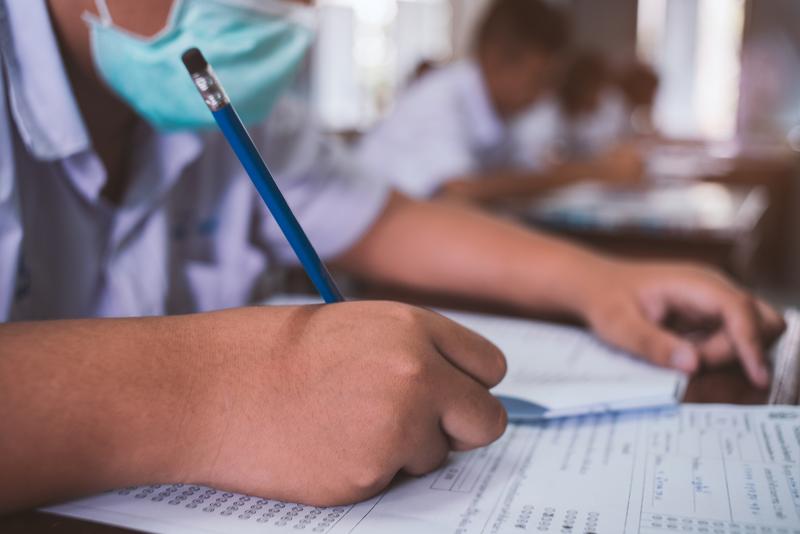In years’ past, standardized test scores have been pretty crucial to the college admissions process. However, recently, colleges have pushed back against this college application norm, citing concerns over how accurate the results are for each student.
It's a fact: some students are just bad test takers. Others don’t have the same access to tutoring and preparation that others do, giving some an unfair advantage. Finally, for some students, prepping for the SAT or ACT is a distraction from what matters most to the admissions process: grades in the classroom.
Looking for more COVID-19 student-impact information? Find it here.
However, in the year 2020, the barriers related to standardized testing and performance are on a whole different level. COVID-19 has limited who, where and how the test can be administered. With that, many colleges are going test optional.
What is test optional?
According to
College Board, a college that is test optional “means they allow all or some applicants to decide whether to submit SAT or ACT scores as part of their application.” Though some students may take a standardized test to add to their admissions application, it won’t be counted against students at these test optional schools if they choose not to include an SAT or ACT score.
So if you’re a bad test-taker or don’t have the opportunity to take the test, you can apply to a test optional college, and it won’t be counted against you. The biggest asset students have to their college admissions chances – as well as the most telling of their academic performance – is their GPA.
Are colleges going test optional in response to Coronavirus?
Yes. This year, it’s not just about access to testing resources and balancing academic performance with test prep. Instead, the real concern is safety and potential spread of COVID-19 at testing centers.
Currently, SAT testing centers are closed in a majority of states due to the threat of Coronavirus. For a full list of testing centers that are closed for the September SAT, see the
College Board’s list here. The ACT also has a list of
testing centers that will be closed for the September test dates.
Essentially, it is going to be very difficult for most students to take the test amidst the global pandemic. As a result, many colleges are going test optional, and the National Association for College Admission Counseling (NACAC) is urging even more colleges to do so. According to
NACAC, nearly 475 colleges have agreed to make testing optional to the 2020 – 21 admissions cycle, and that number is increasing every day.
Will we see a return to standardized testing after COVID?
At the same time that NACAC is proposing that more colleges go test optional in light of COVID-19, it’s also pushing to make this outlook on standardized tests the new normal going forward. Or, at least asking colleges to weigh the importance it has been given them in the past. Of standardized testing, the
NACAC report states:
"Postsecondary institutions have effectively entrusted the College Board and ACT with the authority of serving as a third-party certifier of students’ qualification for admission. As the population interested in admission to college has rapidly expanded and diversified, however, testing agencies have not been able to ensure that the access to and availability of test administrations, the quality of the testing experience, and the integrity and validity of test scores are preserved consistently…Moreover, 'test prep' -- at first scorned by the testing agencies and now embraced -- has burgeoned into a billion-dollar industry, creating added equity challenges and calling into question the reliability of test scores as true measures of student abilities."
Additionally, this week a California judge ruled that the University of California can no longer be “test optional.” Rather, the college is not allowed to consider standardized testing scores at all in the admissions process, reports
CNN. The judge claimed that going “test optional” gives privileged, non-disabled students a “second look” in the college admissions process; whereas underprivileged students or those with disabilities would be denied that opportunity because of inaccessibility to testing centers, especially in light of the pandemic.
COVID has, no doubt, required us to examine many aspects of our life in order to deem what is necessary and what is not. Perhaps standardized testing may be one of those aspects that looks vastly different in a post-COVID world.
SAT/ACT Test Dates (Tentative)
Below are the
SAT and ACT test dates for the 2020 – 21 school year. However, students need to do their due diligence to get the latest information on whether or not their test center is up and running as well as what happens on test day if they do not meet the requirements, which are as follows:
• Cannot have come into close contact (within 6 feet) of someone who has tested positive for COVID-19 or who may have COVID-19.
• Cannot be experiencing any of the following symptoms: cough, fever, chills, muscle pain, shortness of breath or difficulty breathing, sore throat, new loss of taste or smell.
• Not violating any travel restrictions or quarantine requirements.
• Agree to wear a mask the entire time they are at the test center and follow instructions of all test center staff until dismissal.
• Accept the risk that despite the precautions taken at the testing center, there is still the possibility of contracting COVID-19 while taking the test.
SAT Test Dates
August 29
September 26
October 3
November 7
December 5
March 13, 2021
May 8, 2021
June 5, 2021
ACT Test Dates
September 12
September 13
September 19
October 10
October 17
October 24
October 25
December 12
February 6, 2021
April 17, 2021
June 12, 2021
July 17, 2021
Again, be sure that you check to see whether or not your testing center will be open on your registered test day.
SAT Testing Center Closure Information
ACT Testing Center Closure Information

